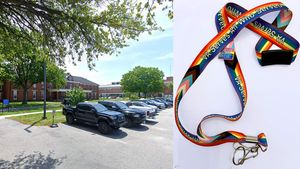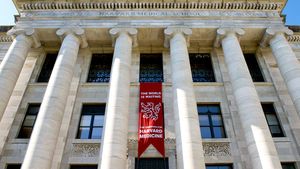Treatment GuideJust DiagnosedSex & DatingAfrican AmericanStigmaAsk the HIV DocPrEP En EspañolNewsVoicesPrint IssueVideoOut 100
CONTACTCAREER OPPORTUNITIESADVERTISE WITH USPRIVACY POLICYPRIVACY PREFERENCESTERMS OF USELEGAL NOTICE
© 2025 Pride Publishing Inc.
All Rights reserved
All Rights reserved
By continuing to use our site, you agree to our Privacy Policy and Terms of Use.
Prodded by a California stem cell'research ballot initiative that received 59% of voter support in November 2004, officials at the University of California, Los Angeles, have launched the school's Institute for Stem Cell Biology and Medicine. The institute will study stem cell'based approaches to treating cancer, neurological diseases, and HIV disease. The $20 million institute will conduct research using both adult and embryonic stem cell lines to gain better insight into how diseases develop; researchers also hope to identify new methods to treat these diseases, says UCLA chancellor Albert Carnesale. The institute will enable the university to 'build upon the existing body of knowledge for the benefit of people worldwide,' Carnesale says. UCLA scientists are already exploring how HIV blocks stem cell function as well as stem cell approaches to combating HIV disease, university officials say. One potential therapeutic approach would be to insert genes that promote antiviral activity in blood-forming stem cells and then reinsert these newly primed cells into the body. As the resulting blood cells form in the body, the gene would protect them from HIV infection. The UCLA AIDS Institute has already completed a Phase I clinical trial of this approach using adult stem cells. Researchers now hope to conduct a similar trial using embryonic stem cells through the newly launched institute. The use of embryonic cells would prevent having to isolate patients' cells, ease transplantation, and increase clinical usefulness, according to UCLA scientists. Researchers also are hopeful that adult and embryonic stem cell research at the institute will lead to revolutionary new treatments for Parkinson's disease, spinal cord injuries, Alzheimer's disease, cancer, and other neurological ailments, but they acknowledge that any such treatments are likely years or even decades away. 'Embryonic stem cells have the power to develop into every type of human tissue,' says Owen Witte, MD, who is a UCLA professor of microbiology, immunology, and molecular genetics as well as the director of the stem cell institute. 'If we can learn how they are regulated for growth and development, we can harness this knowledge to study tissue development and regeneration and potentially come up with new ways to fight many life-threatening diseases.' UCLA will devote $20 million over the next five years to the institute, which will bring together experts in bioengineering, imaging, molecular genetics, immunology, ethics, hematology-oncology, and cellular biology to collaborate on stem cell'related research. The money will pay for recruitment for a dozen new faculty positions, salaries, and expansion of highly sophisticated laboratory space, infrastructure, and supplies, according to university officials. Institute researchers will also be able to jointly apply for state-funded stem cell grants through the voter-approved new law that will provide $3 billion over 10 years for such research. The first such state grant applications are slated to be made available in May. A 29-member oversight and governing board will oversee the institute and review requests for funding. 'With the launch of this institute we realize our goal of bringing together scientific, ethical, legal, and policy experts from across the UCLA campus to focus on the great promise of stem cell research,' says Gerald S. Levey, MD, vice chancellor for medical sciences and dean of UCLA's David Geffen School of Medicine. 'As dean, I am committed to advancing the full potential of stem cell research to find novel and more effective therapies to treat many diseases for which present-day therapy is either unsatisfactory or unavailable.'
From our Sponsors
Most Popular
BREAKING: Supreme Court rules to save free access to preventive care, including PrEP
June 27 2025 10:32 AM
Thanks to U=U, HIV-positive people can live long, happy, healthy lives
July 25 2025 2:37 PM
Plus: Featured Video
Latest Stories
Amazing People of 2025: Javier Muñoz
October 17 2025 7:35 PM
It’s National PrEP Day! Learn the latest about HIV prevention
October 10 2025 9:00 AM
“I am the steward of my ship”: John Gibson rewrites his HIV narrative
September 16 2025 2:56 PM
“So much life to live”: Eric Nieves on thriving with HIV
September 03 2025 11:37 AM
The Talk: Owning your voice
August 25 2025 8:16 PM
The lab coat just got queer
August 21 2025 10:00 AM
Messenger RNA could be the key to an HIV vaccine — but government cuts pose a threat
August 20 2025 8:02 AM
The Talk: Beyond the exam room
August 13 2025 3:15 PM
The Talk: Navigating your treatment
August 01 2025 6:02 PM
The Talk: Starting the conversation
July 25 2025 4:47 PM
How the Black AIDS Institute continues to fill in the gaps
July 25 2025 1:06 PM
“I felt like a butterfly”: Niko Flowers on reclaiming life with HIV
July 23 2025 12:22 PM
Dancer. Healer. Survivor. DéShaun Armbrister is all of the above
July 02 2025 8:23 PM
1985: the year the AIDS crisis finally broke through the silence
June 26 2025 11:24 AM
VIDEO: A man living with HIV discusses his journey to fatherhood
June 10 2025 4:58 PM
Trump admin guts $258 million in funding for HIV vaccine research
June 03 2025 3:47 PM
Grindr is reminding us why jockstraps are so sexy and iconic
May 02 2025 5:36 PM
HRC holds 'die-in' to protest Trump health care cuts
April 28 2025 2:11 PM


































































